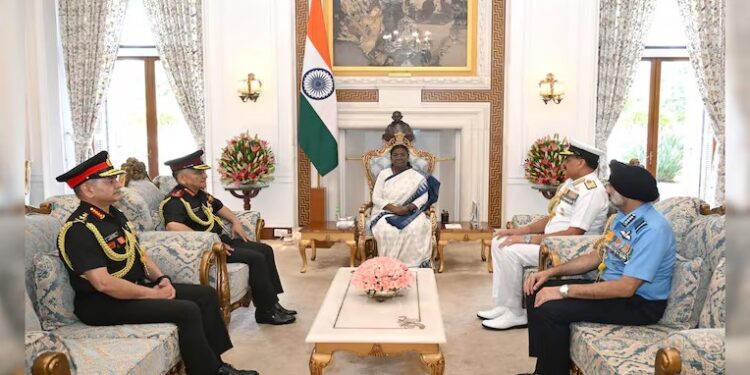India-Pakistan Tensions: CDS Anil Chauhan and Service Chiefs Brief President Droupadi Murmu on Operation Sindoor
In a significant development amidst ongoing India-Pakistan tensions, Chief of Defence Staff (CDS) General Anil Chauhan, accompanied by the chiefs of the Indian Army, Navy, and Air Force, briefed President Droupadi Murmu on the latest military operation, Operation Sindoor. This operation was launched on May 7 as a direct response to the Pahalgam terror attack on April 22, which claimed the lives of 26 Indian nationals.
The Launch of Operation Sindoor
India’s Operation Sindoor was a decisive military initiative aimed at dismantling the terror infrastructure located in Pakistan and Pakistan-Occupied Kashmir (PoK). The operation was launched as a retaliatory measure following the Pahalgam terror attack, an assault that left several Indian citizens dead and wounded many others. The attack, which was carried out by Pakistan-based terrorist organizations, led to a surge in tensions between India and Pakistan. In retaliation, the Indian government, with the backing of its armed forces, authorized Operation Sindoor.
The primary objective of the operation was to neutralize the terrorist infrastructure that operated from the western neighbor’s territory and to ensure that Pakistan-Occupied Kashmir, often regarded as a hotbed for terrorism, did not serve as a safe haven for hostile groups targeting India.
Military Briefing to President Murmu
On May 10, 2025, General Anil Chauhan, accompanied by the three services chiefs—General Upendra Dwivedi (Army), Air Chief Marshal A. P. Singh (Air Force), and Admiral Dinesh K. Tripathi (Navy)—paid a visit to President Droupadi Murmu at Rashtrapati Bhavan. The four military leaders delivered an in-depth briefing on the execution and outcomes of Operation Sindoor.
The President was briefed on the strategic planning, operational successes, and the impact of the mission on both the military and geopolitical front. In particular, the brief centered on the successful neutralization of critical terrorist infrastructure across the border, as well as the coordinated efforts between the three military branches.
The Indian leadership, as represented by the armed forces, emphasized that the operation demonstrated India’s commitment to securing its borders and protecting its citizens from cross-border terrorism. President Droupadi Murmu was informed about the meticulous planning that went into the operation, which was carried out with precision to ensure minimal collateral damage, while delivering a significant blow to the terrorist organizations operating in the region.
President Murmu’s Acknowledgment
In response to the briefing, President Murmu lauded the valour and professionalism demonstrated by the Indian armed forces during the operation. She commended the dedication and commitment of the soldiers who carried out the operation, which not only secured the safety of the Indian people but also sent a strong message of India’s unyielding resolve against terrorism.
The President particularly highlighted the operational success of the mission, which had made India’s response to the terrorist attack in Pahalgam a resounding success. According to an official statement from the Rashtrapati Bhavan, President Murmu noted that the execution of the operation was exemplary, reinforcing the Indian military’s ability to handle complex and high-pressure situations with precision.
Her praise underscored the importance of the armed forces in defending the nation and securing its borders, especially given the volatile nature of the region. Furthermore, she acknowledged the ongoing efforts by the Indian military to safeguard India’s sovereignty and to protect the peace and security of its citizens from external threats.
Strategic Implications and Significance of Operation Sindoor
Operation Sindoor is a clear indication of India’s growing strategic capabilities and its resolve to combat terrorism, regardless of where the threats emerge from. The operation not only highlights the Indian military’s efficiency and readiness but also serves as a message to Pakistan regarding India’s commitment to taking proactive measures against cross-border terrorism.
The operation was conducted in a manner that avoided direct confrontation but made sure that the military objectives were achieved effectively. This level of precision is a testament to India’s advanced technological capabilities, including its surveillance, intelligence gathering, and precision-strike capabilities.
For India, the operation signifies a shift towards a more robust stance in the face of repeated provocations from Pakistan-based terror groups. It also enhances India’s position in the region, reinforcing its commitment to ensuring peace and stability, while also reminding the international community about the severe consequences of harboring or supporting terrorism.
Additionally, the operation also sends a strong signal to international diplomatic forums that India is prepared to take unilateral action if necessary, to ensure the safety of its citizens and sovereignty. This could have broader geopolitical implications, influencing the strategic calculations of not only Pakistan but also other regional and global powers who have a stake in the security dynamics of South Asia.
Future Considerations and the Path Ahead
While Operation Sindoor is a significant success for India, it is expected to be only one part of a broader, long-term strategy for dealing with cross-border terrorism. The Indian military is likely to continue strengthening its counter-terrorism strategies and operational readiness in the region. There are also discussions on the broader geopolitical implications, particularly the effect this operation may have on India-Pakistan relations moving forward.
In the near future, it is expected that India will continue to engage in dialogue with international bodies to address the issue of terrorism emanating from Pakistan. While military operations like Sindoor are necessary for immediate deterrence, India also remains committed to pursuing diplomatic avenues to ensure that Pakistan takes more significant steps to curb the support for terrorist activities.
In conclusion, Operation Sindoor not only demonstrates the Indian military’s capability and resolve but also reaffirms the nation’s unwavering stance against terrorism. With full backing from the President and the Indian government, the armed forces continue to carry out their responsibilities to secure the nation’s borders and ensure the safety of its citizens. As tensions between India and Pakistan continue to simmer, the outcome of this operation will likely influence future defense strategies and diplomatic engagements in the region.















 Categories
Categories









